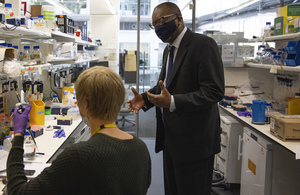
Leading UK businesses and researchers in £75 million collaboration to create technologies of the future

Nine innovative business-led research partnerships to develop technologies such as accelerated medicine discovery, green household products and sensor technology for drivers.
Leading UK businesses and research institutions will join forces to develop new technologies, from 3D imaging accelerating medicine discovery, to transforming waste into eco-friendly household products.
Announced today (Friday 2 April 2021) by Business Secretary Kwasi Kwarteng, 9 new partnerships will bring together expertise from some of the UK’s most prominent businesses and research institutions to develop innovations in support of the UK’s key priorities, such as tackling climate change and boosting medical research.
Backed by a £75.2 million joint investment from government, business and academia, the business-led collaborations will draw on existing industry and research strengths in regions across the UK, from Teesside to Bristol, to create products and technologies that can drive economic growth and create highly skilled local jobs.
Innovations receiving funding today include the development of synthetic biology to improve the cost effectiveness of drugs to treat diseases such as cancer, sensor technology to help reduce distraction for drivers, and converting waste into clean household products such as shampoo.
To mark the announcement, the Business Secretary this week visited the Francis Crick Institute, which is partnering with British pharmaceutical firm GSK in a joint mission to accelerate medicine discovery. There he learnt how the 2 businesses will collaborate by integrating next generation chemistry with new technologies to speed up the development of medicines to help treat disease.
Business Secretary Kwasi Kwarteng said:
“As we build back better through innovation, we are putting the funding and structures in place so those at the top of their field – in business, research and academia – can develop world class products and technologies that could change all our lives for the better. The partnerships we are throwing our weight behind today all have innovation at their core.
When I visited the Francis Crick Institute this week, it was fantastic to see their ongoing work with GSK to speed up the development of new medicines. The coronavirus pandemic has taught us how vital collaboration is between industry and science and I hope partnerships like this will help in our efforts to prepare for and respond to future pandemics.
By bringing together business and research expertise in regions across the UK, we will help to drive local economic growth and create highly skilled jobs, all while cementing the UK’s status as a science superpower.”
As a result of the new financial support, Unilever will partner with the Universities of Liverpool and Oxford to reduce the carbon footprint of everyday consumer products such as shampoo and laundry detergent. The collaboration will see researchers inventing and designing sustainable materials from waste by using methods such as carbon capture, helping to decarbonise the global chemical supply chain and contribute to the UK’s net zero ambitions.
Technology company Ultraleap will partner with University College London (UCL) to develop acoustic technology that allow people to ‘feel’, ‘hear’ and ‘see’ virtual 3D objects and holograms. It aims to demonstrate this in interactive mid-air applications such as VR training simulators, novel user interfaces in cars, digital signage and interactive kiosks. For example, mid-air interfaces can help reduce driver distraction during human-car interactions by enabling buttons, dials and other controls to find the driver who could hold their hand out and feel the buttons to change the audio, answer a phone call or check the navigation.
Today’s government funding is being delivered through the Engineering and Physical Sciences Research Council (EPSRC) and is part of the flagship Prosperity Partnerships programme. It builds on the government’s commitment to raise economy-wide investment in research and development to 2.4% by 2027.
EPSRC Executive Chair, Professor Dame Lynn Gladden, said:
To tackle key challenges, such as achieving net zero, and seize new opportunities we need to harness the world-class expertise of both industry and academia.
The Prosperity Partnerships announced today do this by supporting collaborations that will develop transformative new technologies with the potential to deliver societal impact and economic growth.
By NEPIC
607 Views
Recent Posts
- Introducing the Tab-Ex® 05: Future-Ready Mobility for Industry
- NEPIC spoke with px Group to discover more about the organisation supporting women in industry and apprenticeships on Teesside
- Enhancing caustic soda production with clamp-on ultrasonic flow measurement
- Unlocking faster cancer treatments: The power of Project Orbis
- Celebrating 5 Years at The Wilton Centre: A Milestone for Projex Solutions
Back to News >



